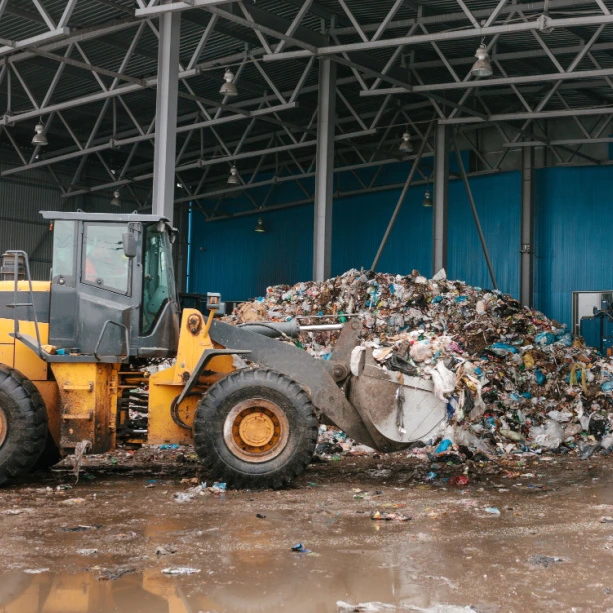Waste management is a pressing issue in our modern world. Increasing population, rapid urbanization, and changing consumption patterns have led to a surge in waste generation. Traditional waste management methods struggle to keep up with the mounting waste, leading to inefficiencies, environmental hazards, and escalating costs. However, through the advent of smart technology, a transformative solution has emerged in the form of smart waste management. This innovative approach harnesses cutting-edge technologies and data-driven strategies to optimize waste collection, disposal, and recycling processes. In this article, we will take a look at the top five reasons why embracing smart waste management is crucial for a cleaner, more sustainable future.
Increase Your ROI by Investing in AirFinder Everywhere
- Loss Prevention. Reduce the amount of loss that occurs during the supply chain process
- Location Coverage. AirFinder Everywhere uses a combination of GPS, Cellular, and WiFi to determine location everywhere
- Security Alerts. Know when a delay in shipment has occurred so the problem
can be addressed immediately.
1. Enhanced Efficiency and Cost Reduction
In order to improve your fleet utilization, you need a way to quantify your fleet’s current utilization. There are a number of strategies that can be used to make this assessment, but the one that will allow you to most effectively display your growth is a common metric referred to as your “fleet utilization rate.” In fact, it’s quite likely that you measure this already – our goal is to provide you with new perspectives on the ways you can apply this measurement to achieve your operational goals.
An standard asset utilization rate is a measure of how effectively your assets are being utilized in a given period. For fleet utilization specifically, this metric is going to be most concerned with your trailers and perhaps your trucks. Different companies may define this number in different ways, depending on their goals. In the first, the measurement is used to quantify the proportion of time that fleet assets are actively engaged in productive activities compared to idle or underutilized periods. This number is found by dividing total operational hours by total available hours. In the second, the measurement is used to quantify the number of fleet assets that are actively engaged in productive activities compared to those sitting idle or underutilized. This number is calculated by dividing the total number of assets currently in use to the total number of assets a company owns, including those that might currently be out of commission due to maintenance.
While most companies tend to focus on one metric or the other, both are important to consider when attempting to improve fleet utilization. An effective fleet optimization plan will only become more effective if it accounts for both the activity time of individual assets and the comparison between which assets are and aren’t being used in the first place. This allows you to not only make decisions to reduce idle time for individual resources, but it also helps you ensure that you are properly cycling through every asset that you have at your disposal.
The inefficiency of conventional waste collection and disposal systems is a significant challenge faced by municipalities and waste management companies worldwide. These systems typically rely on predetermined routes and schedules for waste collection, leading to inefficiencies when bins are not full or missed pickups when they overflow. Smart waste management, on the other hand, leverages real-time data obtained from sensors installed in waste containers. These sensors monitor the fill levels of bins, allowing waste collection trucks to optimize their routes based on actual requirements. By deploying data-driven approaches, smart waste management streamlines the waste collection process, reducing fuel consumption, and minimizing wear and tear on collection vehicles. Consequently, this leads to a considerable reduction in operational expenses which makes waste management more sustainable and cost-effective in the long run.
Additionally, an advanced software for waste management enables predictive maintenance, as sensors can detect potential issues with collection vehicles and equipment. Early identification of problems allows for timely repairs and prevents costly breakdowns, further contributing to cost reduction.
2. Environmental Benefits and Reduced Carbon Footprint
Traditional logistics waste management practices often contribute to environmental degradation and an increased carbon footprint. Inefficient collection methods lead to more vehicles being used to collect the same amount of waste, resulting in higher greenhouse gas emissions and air pollution. Furthermore, overflowing waste bins attract pests and scavengers, leading to littering and contaminating nearby areas. The resulting pollution adversely affects local ecosystems, wildlife, and public health.
In contrast, smart waste management's real-time monitoring and optimized collection routes help mitigate these environmental impacts. By reducing the number of collection vehicles on the road and optimizing their routes, smart waste management significantly reduces greenhouse gas emissions and air pollution. Timely waste collection also minimizes the risk of littering and environmental contamination while preserving the natural beauty of our surroundings.
Moreover, a smart waste monitoring system encourages proper waste segregation and recycling. By promoting recycling practices, these systems divert a substantial portion of waste away from landfills, reducing the burden on these facilities and conserving natural resources. Embracing smart waste management contributes to a circular economy, wherein waste is treated as a valuable resource rather than a burden.
3. Real-Time Monitoring and Data Analytics
A smart waste tracking system thrives on cutting-edge technologies such as the Internet of Things and data analytics. IoT sensors installed in waste bins continuously monitor their fill levels to send real-time data to a centralized platform. Your waste management leaders can then access this data and analyze it to make informed decisions about pick-up times. With the aid of data analytics, your team can identify trends, patterns, and anomalies in waste generation and collection. These insights help optimize waste collection schedules, allocate resources efficiently, and identify areas with persistent waste management challenges. By proactively addressing issues such as overfilled bins or irregular waste generation patterns, your company will improve waste collection processes and overall operational efficiency.
Furthermore, data analytics aids in long-term planning and resource allocation. Historical data can predict waste generation trends which will help your organization anticipate future demands and allocate resources accordingly. The ability to adapt to changing circumstances ensures that waste management processes remain efficient and effective, even in the face of dynamic urban landscapes.
4. Citizen Engagement and Waste Awareness
Smart waste management systems promote citizen engagement and encourage responsible waste disposal behavior. Many smart waste systems include user-friendly portals that allow residents to interact with waste management authorities directly. Citizens can report issues such as overflowing bins or damaged collection equipment which ultimately enables prompt resolution of waste management problems. Additionally, these applications provide valuable information to users, educating them about proper waste segregation practices, recycling guidelines, and eco-friendly habits. By increasing public awareness, waste tracking fosters a culture of waste reduction and recycling within communities. Citizens become active participants in the waste management process which leads to more responsible waste disposal practices and reduced contamination of recyclable materials.
Smart waste management's transparent and accessible approach also helps build trust between waste management authorities and the public. Engaging citizens in waste management initiatives creates a sense of ownership and responsibility, promoting the shared goal of building cleaner and healthier neighborhoods.
5. Future-Proofing Waste Management
As cities continue to grow and technology rapidly evolves, the need to future-proof waste management becomes increasingly critical. Smart waste management systems are designed with adaptability and scalability in mind. These systems can easily integrate new technologies, such as artificial intelligence and advanced sensors, to enhance their functionalities further. Smart waste management is scalable and capable of expanding to accommodate the needs of growing urban areas. Whether it's a small community or a bustling metropolis, smart waste management systems can be tailored to suit various contexts. By investing in smart waste management, cities and states can build a strong foundation for sustainable waste management practices in the future. These systems ensure that waste disposal and recycling processes remain efficient, effective, and aligned with the changing needs of society.
Smart Waste Management Through Link Labs
Link Labs is a leading force in revolutionizing waste management through our range of smart innovative asset tracking solutions. By harnessing the potential of IoT and advanced connectivity technologies, we have established ourselves as a driving force in optimizing waste collection, reducing operational costs, and promoting environmental sustainability. Our success in smart waste management lies heavily on our advanced expertise in developing and deploying IoT sensor technology that seamlessly integrates into waste bins and containers.
Our IoT sensors continuously and accurately monitor the fill levels of waste bins in real time. This data provides waste management authorities with invaluable insights into waste generation patterns and collection requirements. Armed with this information, waste management companies can devise optimized waste collection routes, ensuring that collection trucks are dispatched only when bins reach their capacity. As a result, unnecessary trips are minimized, leading to significant fuel savings and a reduction in carbon emissions. The real-time monitoring facilitated by Link Labs' technology allows waste management leaders to take a proactive approach to waste collection. By staying ahead of the demand curve and addressing issues promptly, your company can prevent overflowing bins, thereby mitigating littering and environmental contamination. The reduction in waste overflow not only maintains the aesthetic appeal of communities, but also safeguards local ecosystems and public health.
Our data-driven approach is the best solution to further enable informed decision-making. With our AirFinder Everywhere solution, waste management leaders can now analyze historical data and trends to anticipate future demands and allocate resources more efficiently. This capability helps future-proof waste management systems, ensuring that they remain effective and adaptable to evolving urban landscapes and population growth.
Beyond operational efficiency and environmental benefits, Link Labs' smart waste management solutions promote sustainability and citizen engagement. By integrating IoT technology into waste containers, we empower citizens to participate actively in the waste management process. This transparent approach strengthens trust between communities and waste management authorities, fostering a sense of ownership and shared responsibility for waste disposal.
Link Labs' dedication to smart waste management extends to proactive maintenance. With the IoT sensors continuously monitoring waste bins, early detection of issues with collection vehicles and equipment becomes possible. Timely repairs and maintenance prevent costly breakdowns and ensure a more efficient waste management operation.
Link Labs is at the forefront of transforming waste management through its innovative smart solutions. Our data-driven approach not only improves the efficiency of waste management systems, but also empowers citizens to actively engage in responsible waste disposal practices. With our innovative smart waste management solutions, communities can build a cleaner, greener, and more sustainable future.
Conclusion
Smart waste management represents a paradigm shift in how we approach waste collection, disposal, and recycling. By harnessing the power of technology, data analytics, and citizen engagement, smart waste management offers a plethora of benefits that extend beyond conventional methods. From improved operational efficiency and cost reduction to environmental preservation and fostering waste awareness, these systems provide a comprehensive solution to the pressing challenges of waste management in the 21st century. Embracing smart waste management is not only an investment in a cleaner and healthier future, but also a step towards building sustainable, resilient communities for generations to come. If you want to learn more about how Link Labs can help you with smart waste management, visit our website and book a demo today!




